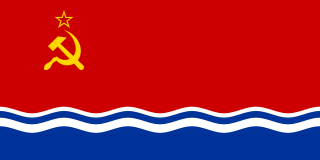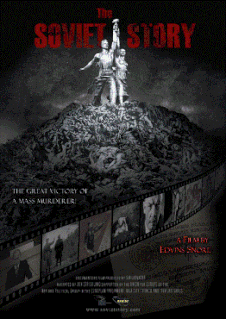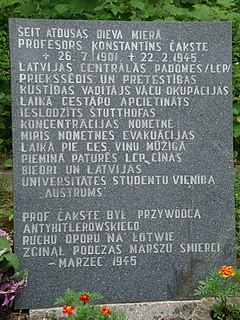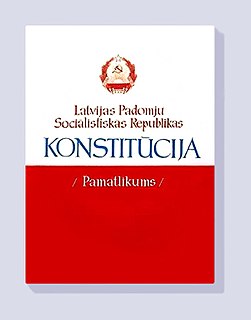
The Latvian Soviet Socialist Republic, also known as Soviet Latvia, was one of the 15 constituent republics of the Soviet Union from 5 August 1940 to 6 September 1991.

The Prime Minister of Latvia is the most powerful member of the Government of Latvia, who presides over the Latvian Cabinet of Ministers. The officeholder is nominated by the President of Latvia, but must be able to obtain the support of a parliamentary majority in the Saeima.

Kārlis Augusts Vilhelms Ulmanis was a Latvian politician. He was one of the most prominent Latvian politicians of pre-World War II Latvia during the Interwar period of independence from November 1918 to June 1940. He served four times as prime minister, the last time as the head of an authoritarian regime, during which he subsequently also adopted the title of President of Latvia. The legacy of his dictatorship continues to divide public opinion in Latvia today.

The Popular Front of Latvia was a political organisation in Latvia in the late 1980s and early 1990s which led Latvia to its independence from the Soviet Union. It was similar to the Popular Front of Estonia and the Sąjūdis movement in Lithuania.

The Bank of Latvia is the central bank of Latvia. It is among the nation's key public institutions and carries out economic functions as prescribed by law. It was established in 1922.

Anatolijs Gorbunovs, also known as Anatoly Valeryanovich Gorbunov, is a Latvian politician who served as the Chairman of the Supreme Soviet during the final years of the Soviet regime in Latvia and as Chairman of the Supreme Council of Latvia during the first years after the country regained its independence.

Riga City Council is the government of the city of Riga, the capital of Latvia. Its meeting place is in the Riga Town Hall at the Town Hall Square (Rātslaukums) in the very heart of Riga.

Māris Gailis is a Latvian businessman and former politician. He is the former Prime Minister of Latvia, an office he held from September 1994 to December 1995. In the government of the Prime Minister Valdis Birkavs, Gailis became a Minister of State Reform; in the government of the Prime Minister Andris Šķēle, he was the Minister of Environmental Protection and Regional Development. As a member of the right-wing liberal political party Latvian Way, he was elected in the 5th Saeima and 6th Saeima. He led a round-the-globe expedition on the yacht Milda from 2001 to 2003.

The Constitution of Latvia is the fundamental law of the Republic of Latvia. Satversme is the oldest Eastern or Central European constitution still in force and the sixth oldest still-functioning republican basic law in the world. It was adopted, as it states itself in the text, by the people of Latvia, as represented in the Constitutional Assembly of Latvia, on 15 February 1922 and came into force on 7 November 1922. It was heavily influenced by Germany's Weimar Constitution and the Swiss Federal Constitution. The constitution establishes the main bodies of government ; it consists of 116 articles arranged in eight chapters.

The Act of the Re-Establishment of the State of Lithuania or Act of March 11 was an independence declaration by Lithuania adopted on March 11, 1990, signed by all members of the Supreme Council of the Republic of Lithuania led by Sąjūdis. The act emphasized restoration and legal continuity of the interwar-period Lithuania, which was occupied by the Soviet Union and lost independence in June 1940. It was the first Soviet republic of the 15 Soviet republics to declare independence from the Soviet Union. The other 14 Soviet republics would later declare their independence. These events would cause the dissolution of the Soviet Union in 1991.
Eduards Berklavs was a Soviet and Latvian politician.

The Declaration "On the Restoration of Independence of the Republic of Latvia" was adopted on 4 May 1990 by the Supreme Soviet of the Latvian SSR in which Latvia declared independence from the Soviet Union. The Declaration stated that, although Latvia had de facto lost its independence in 1940, when it was annexed by the Soviet Union, the country had de jure remained a sovereign country as the annexation had been unconstitutional and against the will of the Latvian people. Therefore, it resolved that the Molotov–Ribbentrop Pact and the Soviet occupation of Latvia in 1940 were illegal. It also asserted that the heavily rigged 1940 elections were illegal and unconstitutional, and that all acts of the "People's Saeima" chosen at that election–including the request to join the Soviet Union on 21 July 1940–were ipso facto void.

The first relatively free election to the Supreme Soviet (Rada) held in the Ukrainian Soviet Socialist Republic took place in several stages, from March 4 to March 18, 1990. The elections were held to elect deputies to the republic's parliament, the Verkhovna Rada. Simultaneously, elections of local provincial ("oblast'") councils also took place in their respective administrative divisions.

The Soviet Story is a 2008 documentary film about Soviet Communism and Soviet–German relations before 1941 and after, written and directed by Edvīns Šnore, and sponsored by the Union for Europe of the Nations group in the European Parliament. The film features interviews with Western and Russian historians such as Norman Davies and Boris Vadimovich Sokolov, the Russian writer Viktor Suvorov, the Soviet dissident Vladimir Bukovsky, members of the European Parliament, and participants and survivors of the Soviet terror. Sokolov later emphasized that he simply offered expert advice and told Šnore that some of the things he claimed were based on obvious falsifications.

Parliamentary elections were held in the Latvian SSR on 18 March 1990. It was the first free parliamentary election in Latvia since 1931 and saw 201 deputies elected to the Supreme Soviet of the Latvian SSR, 170 of them in the first round. Run-off elections were held on 25 March, 1 April and 29 April. The Popular Front of Latvia won over two-thirds of the vote. Unlike its Estonian and Lithuanian counterparts, the Latvian Communist Party did not separate from the Communist Party of the Soviet Union. Nonetheless, on 3 May 1990, the new Supreme Soviet re-elected the Communist Party member Anatolijs Gorbunovs as its chairman, effectively the leader of Latvia. He subsequently resigned from the party, and a year later the Communist Party was banned by the parliament.

The Latvian Central Council was the pro-independence Latvian resistance movement during World War II from 1943 onwards. The LCC consisted of members from across the spectrum of former leading Latvian politicians and aimed to be the governing body of a democratic Republic of Latvia after the war. Its military units were an alternative to the Soviet partisans also operating in Latvia.

The Latvia University of Life Sciences and Technologies, previously Latvia University of Agriculture (LUA), is a university in Jelgava, Latvia, specializing in agricultural science, forestry, food technology and related areas.

Andris Bērziņš is a Latvian businessman and politician who was President of Latvia from 2011 to 2015. Bērziņš was the President of Unibanka from 1993 to 2004. He was elected as President by the Saeima on 2 June 2011.

The dissolution of the Soviet Union was the process of internal disintegration within the Soviet Union (USSR) which resulted in the end of the country's and its federal government's existence as a sovereign state, thereby resulting in its constituent republics gaining full sovereignty on 26 December 1991. It brought an end to the General Secretary Mikhail Gorbachev's effort to reform the Soviet political and economic system in an attempt to stop a period of political stalemate and economic backslide. The Soviet Union had experienced internal stagnation and ethnic separatism. The USSR, although a highly centralized state, was made up of 15 republics that served as homelands for different ethnicities. By late 1991, amidst a catastrophic political crisis, with several republics already departing the Union and the waning of centralized power, the leaders of three of its founding members declared that the Soviet Union no longer existed. Eight more republics joined their declaration shortly thereafter. Gorbachev resigned in December 1991 and what was left of the Soviet parliament voted to end itself.

The 1978 Constitution of the Latvian SSR, officially the Constitution of the Latvian Soviet Socialist Republic was the constitution of the Latvian Soviet Socialist Republic adopted on April 18, 1978 at the eighth session of the 9th Convocation of the Supreme Soviet of the Latvian SSR.



















